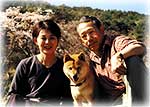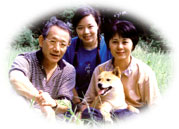Ikuo Nishioka: Venture Hobbyist
Back to Contents of Issue: October 2000
|
by Kyoko Fujimoto |
|||
IN APRIL 1999, I READ ON A NEWS SITE THAT the chairman of Intel Japan was leaving the company. The site had a link to his popular Nikkei BP column, "Letters From Chairman Nishioka." In his farewell column, he wrote, "After I retire, I'm thinking of visiting unknown places in Japan with my wife and Kosuke [his 4-year-old shiba dog], and I'd also like to take my wife around the world to places I've been through business." He went on to criticize Japanese society. Too many employees spend too much time at work and neglect their families, he wrote, even though their efforts aren't fully rewarded as the company grows. "I've worked at Intel for seven years, and worked hard for the past 30 years, including at my previous company [Sharp]. So I think it's time to have fun with my wife. We wouldn't have fun going to a French restaurant in Paris after our teeth are all gone, but now I'm still 56 and my wife is 50 -- we can still enjoy it." There aren't many Japanese men who think that way. Many still take it for granted that they have to commit to work, even if it means neglecting their family. And few think about leaving the company before age 60. After reading what was supposed to be his final column, I became a secret admirer. I hoped to meet him someday. A year and a few months later, I did finally get to meet Ikuo Nishioka -- the president of Mobile Internet Capital.
I wanted to learn more about the fund, but, except for a too-brief press release with no contact details, there wasn't much information on it. All I could find out was that the fund was a joint venture between NTT DoCoMo, IBJ Securities, Internet Research Institute (IRI), and Nishioka. That sounded like something -- I decided I really needed to meet this guy. Thanks to an editor from another publication, I got the number of his secretary and was able to set up an appointment with Nishioka a month later. As it turns out, Nishioka is still a very busy guy. His secretary had a hard time fitting me into his schedule, and even though he's retired from Intel, his meishi has three company names listed on it, and he's president or chairman of them all. Mobile Internet Capital is located in a small office near Akasaka Ark Hills in Tokyo. It's a small office, but very nice, quiet, and cozy. When I walked in, I heard what sounded like a meeting being wrapped up. "My wife tells me ..." a voice was saying in a friendly Osaka dialect. I couldn't see who was speaking, but from the sound of the voice I somehow knew it was Nishioka. Nishioka was born in 1943 in Osaka. He got his master's and doctoral degrees in engineering from the prestigious Osaka University and spent 23 years with Sharp, where he moved up to become head of the computer division research center. In 1992, he joined Intel Japan as vice president, and the following year became president of Intel Japan (and VP of the Worldwide Sales Group). He became chairman in 1997, and two years later retired early. During his career he wrote two books -- loosely translated as Do You Enjoy PCing? and Business Managers Who Don't Care About IT Should Quit Now -- and his column. Through these media vehicles he became well known as an evangelist of PCs, email, all things mobile, and the Net. Nishioka's manner of speaking is very calm and peaceful, but at the same time it has some of that head-of-a-huge-company type dignity. When I asked if he actually spends time with his family under his seemingly hectic schedule, he went on and on about where he's been with his wife -- Okinawa, Hokkaido, the US, Canada, Europe. Nishioka says he usually takes Kosuke along when they travel within Japan. "Even though I look quite busy, I obviously have more time than I used to have when I was with Intel," he says. But Mobile Internet Capital does seem to take up much of his time, and his wife reminds him that that wasn't part of the deal when he left Intel.
Nishioka explains that even if a venture company in Japan has a good technology, it usually can't find a company to buy its products. He felt that what was needed was a systematic way to help such startups. "We're not just trying to get capital gains," he says. "When we were trying to get funds, we explained to the funding companies that we don't play money games." That explains why MIC received all of its funding from big companies -- the NTT group, Sony, Sega, CSK, Mitsubishi, Matsushita, Fuji TV, Dentsu -- and none from the finance industry. MIC aims to invest in small startups -- and not to ones about to go public. "Those companies can do the IPO even if we don't help them," says Nishioka. "We would like to help the actual process of starting up and growing the business." When startups make presentations to MIC, Nishioka checks everything from their staff to their technology. The latter is the most important factor, he says, and MIC's tech standards are quite high. Evaluating technology is a complex process, so MIC gets help from some of its big partners, like NTT. University professors also lend a hand. "Our technology evaluation is exceptionally good for a VC," Nishioka says. "Some ventures say they want an investment exclusively from us because they're confident about their technology." It also helps that Nishioka has a deep technology background himself, though he focuses on evaluating business plans. As we go to press, MIC, which got funded in February, has yet to invest in a startup. Nishioka has seen every presentation made to MIC, but hasn't yet decided on a deal. By the time you read this, he says, at least two companies will have been funded. He declined to say which ones. Though MIC focuses on companies with strong technologies, Nishioka says he sometimes is intrigued by other kinds of startups. "Some companies sell excellent content" he says. "I'm not interested in companies that make money by selling ads, but if the content is interesting, they can certainly sell it." When he finds a venture that would be a good match with one of MIC's funding companies,* Nishioka takes it to make a presentation. "Some of them get scared because I usually go directly to the head of the company. But guys from small startups get to make a presentation directly to the top brass, and many are really happy about the opportunity." Of course, they should be. Startups usually don't have such connections. Nishioka realized this when he got involved with Brando -- nobody paid attention to the company until he informally talked about it with one of the big guys he knew. He then realized how critical matchmaking is for venture companies. "What's bad about huge companies is that their decision making is very slow," says Nishioka. "So I usually ask the big guys to give us an answer within two weeks. I tell them we came to see them first, and if they're not giving us a response soon, we'll take this venture to their competitors -- otherwise the venture can't survive." Nishioka believes VCs should have venture business experience. In the US, he says, VCs have usually succeeded in venture businesses themselves, which is why they're qualified to invest in and advise new venture companies. In Japan, though, what you have are inexperienced startups gathering around inexperienced VCs. Then securities companies gather around them, followed by general investors who don't really know what the ventures do. Nishioka thinks the environment surrounding startups is not yet mature in Japan. "I had only been in the big companies, Sharp and Intel, so I couldn't really understand how the president of a venture company would feel." He thought he needed startup experience and so established a company called OneChannel, an ecom outfit that sells brand-name bags, watches, sports goods, et cetera through partner 7Dream.com. "Do you ever think about going back to a huge company?" I ask. "I never intend to," he replies. "I don't think huge companies can change the world. It will probably be venture companies that change the situation in Japan." He criticizes big Japanese companies for not giving employees enough incentive. "Whether you do a good job doesn't really affect your raise. Promotion is based on seniority, and your pay increases almost automatically," Nishioka complains. "OneChannel will always be small -- even if it can make a lot of profit, there won't be more than ten people."
"Hope mine turn out to be OK," I said. But, sorry, Nishioka-san -- my shots weren't good enough. I had to ask him for more of his time so we could bring in a professional photographer. I also asked if I could borrow pictures of his wife and dog, and he was nice enough to give me a few. (Hence the photo above.) Now I brag to my friends that I have personal photos of the former chair of Intel Japan. They're amazed because he's so big-time, but I tell them that Nishioka is just a friendly, dog-loving family man who now heads up a smaller company and doesn't wear a tie. What he does, though, is still big time.
*MIC's funding companies are NTT DoCoMo, NTT Communications, NTT Data, NTT Software, NTT East, NTT West, Sony, NEC, Mitsuibishi Electric, Matsushita Communication Industrial, Japan Radio, Internet Research Institute, Itochu Techno-Science (CTC), Info Avenue, Fujitsu Support and Service (Fsas), CSK, Itochu Corp., Sumitomo Corp., Lawson, Fujita Shoten, Dentsu, Kadokawa Shoten Publishing, Sharp, Sanyo Electric, Fuji Television Network, JSAT, Secom, Sony Music Entertainment, Avex, JCB, Mori Building, Bic Camera, Sega Enterprises, ans ISAO. |
|||
Note: The function "email this page" is currently not supported for this page.








